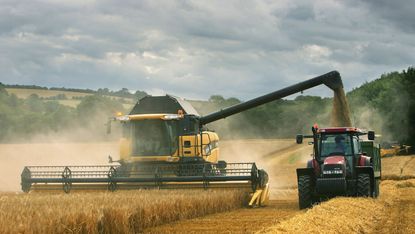Pros and cons of gene-editing crops for food
Controversial technique could improve food security but consumer concerns persist

The government is pushing ahead with legislation that may pave the way for gene-edited food to be grown and sold in England.
The Genetic Technology (Precision Breeding) Bill seeks to modify UK regulation on genetically modified organisms and marks “a major departure from EU policy”, said FarmingUK.
Farming Minister Mark Spencer told LBC’s Nick Ferrari that Britain needed to “protect itself” by “using the technologies available to us” to safeguard food supplies as Russia’s invasion of Ukraine continues.
Subscribe to The Week
Escape your echo chamber. Get the facts behind the news, plus analysis from multiple perspectives.

Sign up for The Week's Free Newsletters
From our morning news briefing to a weekly Good News Newsletter, get the best of The Week delivered directly to your inbox.
From our morning news briefing to a weekly Good News Newsletter, get the best of The Week delivered directly to your inbox.
The aim is to “develop crops that are more resilient to disease, climate change and other impacts, and less reliant on pesticides”, said Politico’s London Playbook.
But the prospect of gene-edited food on British supermarket shelves has proved controversial.
1. Pro: food security amid war
Food security has been a growing concern during the conflict in Ukraine. Russia’s blockades in the invaded country are preventing the export of produce including wheat, leading to rising food prices and global shortages.
Britain is “heavily reliant” on food imports, said The Telegraph, but the gene-editing bill would “remove unnecessary barriers inherited from the EU” and boost food production in the UK. Professor Gideon Henderson, a scientific adviser to the government, told The Guardian that gene-editing could “increase food security” for the UK.
2. Con: public acceptance
The public appetite for genome-edited food is dependent on “perceptions of risks and benefits”, said a January 2022 briefing for the Parliamentary Office of Science and Technology (Post).
Although the perception of risk is “often said to be lower for genome-editing than modification”, “polarised debates” on the issue may “increase public disquiet”, the briefing continued. Education was key, because “surveys and textual analyses” have found that consumers have a “low level of knowledge of genome-editing”.
3. Pro: resistance to disease
An estimated 20% to 40% of crop yield worldwide is lost to pests and diseases, according to the Centre for Agriculture and Bioscience International (CABI).
But “precision technologies allow us to speed up the breeding of crops that have a natural resistance to diseases”, then environment secretary George Eustice told The Telegraph as the bill was unveiled in May.
4. Con: traceability for consumers
A survey last year by the Food Standards Agency found that most UK consumers wanted gene-edited products to be clearly identifiable in supermarkets. But the government is planning to allow these products to be sold without such labelling.
Conservative think-tank Bright Blue has called for greater transparency in labelling and said that consumers should not be “tricked”, The Times reported. The January parliamentary briefing called for an international public registry of all commercial agricultural biotechnology products, including genome editing.
5. Pro: greater nutrition
Gene-editing could be used to create more nutritious crops, such as vitamin D-enriched tomatoes. Earlier this year, scientists announced that they had created genetically edited tomatoes that each contained as much provitamin D3 – the precursor to vitamin D – as two eggs.
Guy Poppy, a professor of ecology at the University of Southampton, told FoodNavigator that “gene-editing tomatoes to accumulate provitamin D3 at levels above recommended dietary guidelines could result in better health for many”.
6. Con: animal suffering
Critics claim the government bill is likely to pave the way for similar changes for livestock gene-editing. Although such changes would be dependent on a regulatory system to safeguard animal welfare, campaigners have warned that livestock gene-editing could reinforce the use of factory farming.
Kierra Box, of Friends of the Earth, told The Guardian that gene-editing was “genetic modification by a different name”. The technique “still focuses on altering the genetic code of plants and animals to deal with the problems caused by poor soils, the over-use of pesticides and intensive farming”, she said.
Create an account with the same email registered to your subscription to unlock access.
Sign up for Today's Best Articles in your inbox
A free daily email with the biggest news stories of the day – and the best features from TheWeek.com
Chas Newkey-Burden has been part of The Week Digital team for more than a decade and a journalist for 25 years, starting out on the irreverent football weekly 90 Minutes, before moving to lifestyle magazines Loaded and Attitude. He was a columnist for The Big Issue and landed a world exclusive with David Beckham that became the weekly magazine’s bestselling issue. He now writes regularly for The Guardian, The Telegraph, The Independent, Metro, FourFourTwo and the i new site. He is also the author of a number of non-fiction books.
-
 6 queer poets to read whenever but especially now
6 queer poets to read whenever but especially nowThe Week Recommends April is National Poetry Month
By Scott Hocker, The Week US Published
-
 How women's pain is often ignored in health care
How women's pain is often ignored in health carethe explainer The gap in care is especially glaring compared to how men are treated
By Theara Coleman, The Week US Published
-
 6 serene homes in Vermont
6 serene homes in VermontFeatures Featuring a four-level Shaker barn in Hartland and a Scandinavian-inspired home in Stowe
By The Week US Published
-
 The issue of women and conscription
The issue of women and conscriptionUnder the radar Ukraine military adviser hints at widening draft to women, as other countries weigh defence options amid global insecurity
By Harriet Marsden, The Week UK Published
-
 Why is Ukraine backing far-right militias in Russia?
Why is Ukraine backing far-right militias in Russia?Today's Big Question The role of the fighters is a 'double-edged sword' for Kyiv, say commentators
By The Week UK Published
-
 Ukraine's unconventional approach to reconstruction
Ukraine's unconventional approach to reconstructionUnder the radar Digitally savvy nation uses popular app to file compensation claims, access funds and rebuild destroyed homes
By Harriet Marsden, The Week UK Published
-
 What does victory now look like for Ukraine?
What does victory now look like for Ukraine?Today's Big Question Not losing is as important as winning as the tide turns in Russia's favour again
By Elliott Goat, The Week UK Published
-
 Where has the Wagner Group gone?
Where has the Wagner Group gone?Today's Big Question Kremlin takes control of Russian mercenaries after aborted mutiny and death of leadership
By Elliott Goat, The Week UK Published
-
 Will Ukraine's leadership reset work?
Will Ukraine's leadership reset work?Today's Big Question Zelenskyy hints at ousting of popular military chief, but risks backlash amid dwindling munitions, delayed funding and Russian bombardment
By Harriet Marsden, The Week UK Published
-
 Rishi Sunak visits Kyiv to announce £2.5 billion in military support for Ukraine
Rishi Sunak visits Kyiv to announce £2.5 billion in military support for UkraineSpeed Read Surprise trip comes amid increased Russian bombardment and escalation of Middle East crisis
By Harriet Marsden, The Week UK Published
-
 Will Putin agree to a Ukraine ceasefire in 2024?
Will Putin agree to a Ukraine ceasefire in 2024?Today's Big Question Russian leader 'ready to make a deal' amid growing opposition to war but 'no evidence' that Kyiv would cede territory
By Harriet Marsden, The Week UK Published